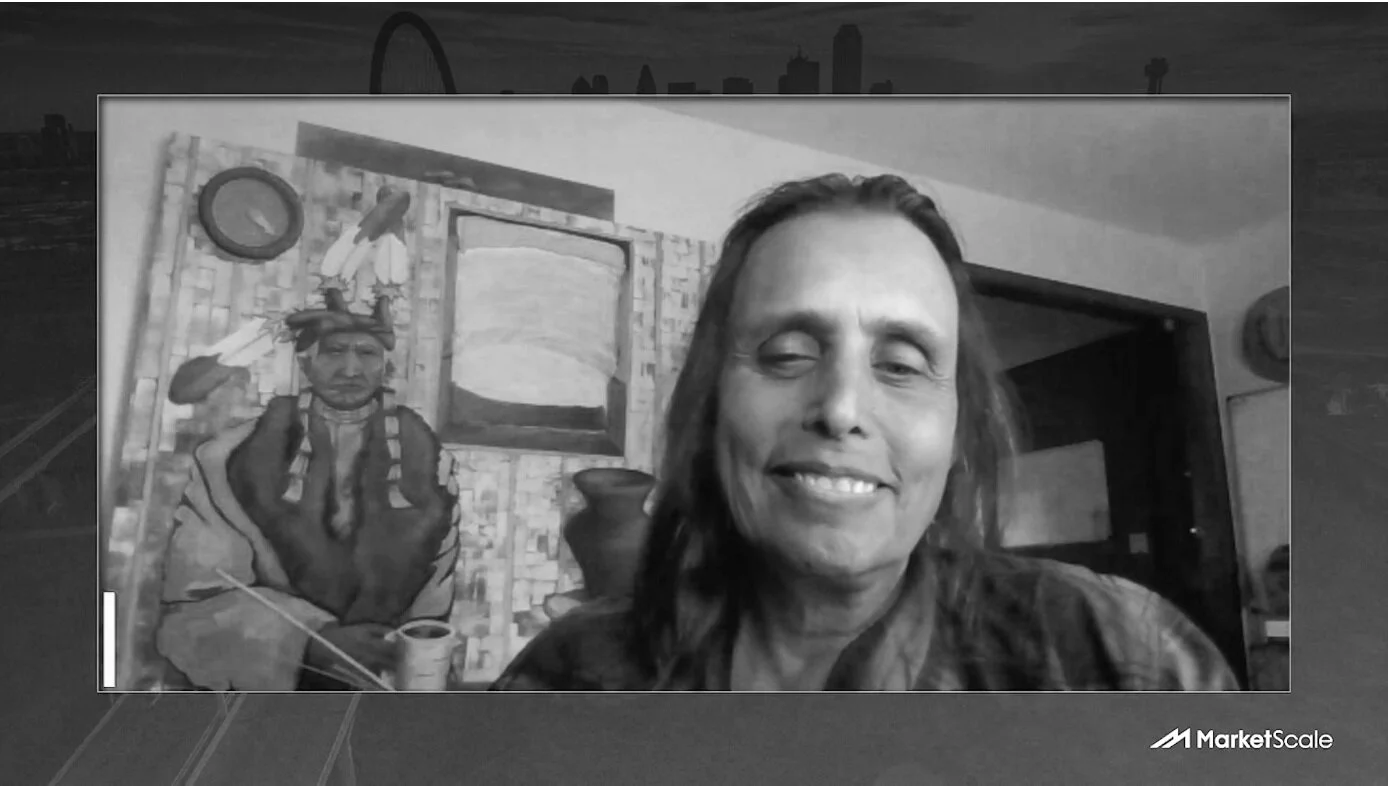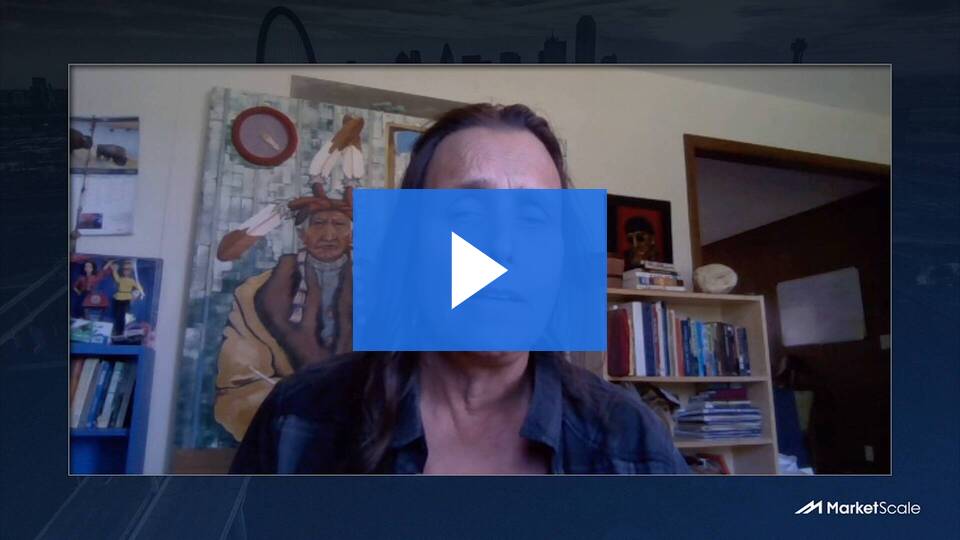Aljazeera Studio B: Unscripted: Indigenous and anti-apartheid lessons for climate justice with Kumi Naidoo and Winona LaDuke
Activists Kumi Naidoo and Winona LaDuke on how to sustain resistance movements and secure a just economic transition.
From the front lines of the anti-apartheid and environmental justice movements, this episode of Studio B: Unscripted features two lifelong activists.
Indigenous and anti-apartheid lessons for climate justice
Activists Kumi Naidoo and Winona LaDuke on how to sustain resistance movements and secure a just economic transition.
From the front lines of the anti-apartheid and environmental justice movements, this episode of Studio B: Unscripted features two lifelong activists.
Author, economist and two-time vice presidential candidate of the US Green Party, Winona LaDuke, is co-founder of Honor the Earth, a non-profit organization dedicated to environmental and Indigenous rights.
In Part 1, they discuss how the COVID-19 pandemic is a wake-up call for major system redesign.
From the front lines of the anti-apartheid and environmental justice movements, this episode of Studio B: Unscripted features two lifelong activists. Author, economist and two-time vice presidential candidate of the US Green Party, Winona LaDuke, is co-founder of Honor the Earth, a non-profit organisation dedicated to environmental and Indigenous rights. An anti-apartheid activist from age 15, Kumi Naidoo later helped with South Africa’s inaugural democratic election. He went on to head Greenpeace and Amnesty International, and is currently Global Ambassador for Africans Rising.
In Part 2, they discuss lessons from Indigenous knowledge and the anti-apartheid struggle for the climate movement.
Why Pipelines Are Becoming Bad Business for the US Oil Industry (Video)
“It’s the end of an era. So anything you’re going to try to put in is going to be pretty much a last [ditch] effort. And the cost overruns of every project, you know, for the fantasy of a pipeline has been so egregious,” LaDuke noted.
Why Pipelines Are Becoming Bad Business for the US Oil Industry
By Daniel Litwin - August 11, 2020
With several major pipelines in the United States having been halted, including the Keystone Pipeline and Dakota Access Pipeline, many are wondering what these changes mean for the future of the US oil industry. Winona LaDuke, Co-Founder of Honor the Earth and former Green Party vice president candidate of Ralph Nader provided expert insight into this topic.
According to LaDuke, there’s been a fleeing of industries from pipelines. “Pipelines are a risky business, you know? And just to be clear, like to me, this is really not just a pipeline question. It’s a question of infrastructure,” LaDuke said. She emphasized that pipes are a necessity, but not for oil companies, “We do need pipes, we do need pipes, but we need pipes that are like water and sewer pipes. We don’t need pipes for oil companies. And so it’s a question of, you know, how are you going to spend your infrastructure money?”
For LaDuke, green energy is the best path forward for the industry. “It’s the end of an era. So anything you’re going to try to put in is going to be pretty much a last [ditch] effort. And the cost overruns of every project, you know, for the fantasy of a pipeline has been so egregious,” LaDuke noted.
LaDuke is optimistic that green energy will provide job opportunities, which is especially valuable in light of recent events. “One of the many things taught to us by the COVID pandemic is that we make everything in China,” she explained. LaDuke believes we need to make renewable energy in the US instead of importing parts from other countries. “We need to rebuild an industrial sector in this country. That makes sense. And that’s what the new green revolution is. That’s the one I’m part of.”
Winona LaDuke + Naomi Klein: Land Rights and Climate Change
Naomi Klein, the award-winning journalist, author, and Rutgers Gloria Steinem Chair of Media, Culture, and Feminist Studies, joins in conversation with rural development economist and Indigenous land rights activist Winona LaDuke. Drawing from their experience on the frontlines of the struggle for a more just and sustainable world, they delve into a host of related questions:
What is the best model of economic development?
What can we learn from First Nations about how to measure wealth, poverty, and equity?
What should the role of government be in confronting the causes of climate change?
What are the implications of the global frameworks proposed for decarbonization and forest protection?
What are the common themes and insights in the stories that women are voicing from the frontlines?
Winona LaDuke + Naomi Klein: Land Rights and Climate Change
As climate change is beginning to alter the planet before our eyes, two internationally recognized activists come together at the Rubin to discuss the economics associated with climate change, the role of First Nations in the climate movement, and the connections between violence against women and violence against the land. Naomi Klein, the award-winning journalist, author, and Rutgers Gloria Steinem Chair of Media, Culture, and Feminist Studies, joins in conversation with rural development economist and Indigenous land rights activist Winona LaDuke. Drawing from their experience on the frontlines of the struggle for a more just and sustainable world, they delve into a host of related questions: What is the best model of economic development? What can we learn from First Nations about how to measure wealth, poverty, and equity? What should the role of government be in confronting the causes of climate change? What are the implications of the global frameworks proposed for decarbonization and forest protection? What are the common themes and insights in the stories that women are voicing from the frontlines?
Book Review of Winona LaDuke: "A Bard for Environmental Justice"
Winona LaDuke Chronicles: A Bard for Environmental Justice "LaDuke is one of the great overlooked orators of our time, and she brings this prowess to every page."
Written by: Georgianne Nienaber
Writer and author
Winona LaDuke’s latest book reads like a prayer. These are holy words— inspirational stories taken straight from the heart of indigenous communities throughout the world. The Winona LaDuke Chronicles: Stories From the Front Lines in the Battle for Environmental Justice is lyrical, instructional, and infused with wry humor when the weight of the message becomes unbearable. LaDuke provides a roadmap through tribal nations’ belief systems; offering a spiritual compass and invaluable insight into the relationship of prophesy to the realities of climate change, economic collapse, food scarcity and basic human rights. As it happens, prophesy does come true and redemption is possible despite this encyclopedia of environmental and spiritual insults.
Are we hell-bent on embracing environmental calamity or is atonement and redemption possible through the lessons offered by indigenous belief systems? How fascinating to learn that corn has a history, that seeds have a profound spiritual meaning, and that plants have a sacred relationship with humans. Provide the environment in which food will flourish and there will be no need for genetic crop engineering.
LaDuke is one of the great overlooked orators of our time, and she brings this prowess to every page.
Her standard biography is well known. A two time Green Party vice-presidential candidate, LaDuke has 40 years of activism behind her. A graduate of Harvard University, LaDuke is an Anishinaabekwe (Ojibwe) enrolled member of the Mississippi Band of Anishinaabeg. In the preface to Chronicles, she offers testimony to all that life teaches. As for those two losing vice-presidential campaigns, in the essay, “Recovering from the Drama of Elections,” LaDuke calls out Republican Speaker of the House Paul Ryan and offers valuable and obvious advice. “People want to be heard.” American politics should be defined by diversity rather than establishment money and corporations afforded the status of personhood.
The metaphors of fire and resurrection infuse the story telling.
“I have now more winters behind me than before me. It has been a grand journey. I am grateful for the many miles, rivers, and places and people of beauty,” LaDuke writes.
It was after the loss of her home to fire in the early days of a bleak 2008 winter; a loss that included books, a lifetime of memorabilia, and sacred objects, that the orator and writer temporarily lost her voice. LaDuke says she could not write, could not sleep and could barely speak. Memory became tenuous as she struggled with the even more profound losses of her father, the father of her children, and her sister. She equates the rock bottom feeling of PTSD with being “a casualty of the modern Indian Wars.” She had lost her loves, her heart and some of her closest friends. But “after the burn” indigenous people know that the fields, the forests and the prairies rebound with new growth. LaDuke found this growth in the writing and the story telling. Now a self-described “modern day bard,” she travels across the land, sharing stories from other lands and writing them down along the way.
These are her chronicles, at once universal and very personal.
In these days of the great Canadian fire that has devastated Fort McMurray, it is a stunning coincidence that in the early pages of Chronicles, LaDuke tells the story of a 2014 meeting with Archbishop Desmond Tutu there. The town, which has endured much suffering in the current news cycles, is the booming center of the Alberta Tar Sands projects. It is also the ancestral home of the Athabasca Chipewyan First Nation. Tutu was there to speak about climate change and global warming. Media coverage criticized Tutu as being misinformed. Tutu warned that pipelines and oil contribute to the devastation of First Nation lands and livelihood and that the resulting climate change would be devastating.
Scientists attribute the Alberta firestorms to climate change. A prophecy fulfilled?
The essay “My Recommended Daily Allowance of Radiation,” slams the North Dakota Department of Health for approving the increase of radioactive materials scuttled in landfills by a factor of 10 or 1000 percent. (from 5 pico curies per liter to 50) It seems the fracking industry was dumping 27 tons a day at 47 pico curies per liter and the illegal dumping issue needed a quick fix. This all scary stuff and LaDuke lays out the rationale for avoiding radioactive materials, especially since not all of it was making it to the landfills. Radioactive filter socks were thrown in ditches and kids found them to be interesting toys.
In that characteristic flash of wry humor, LaDuke quotes a female representative from the North Dakota Oil and Gas Industry. “Nuclear radiation isn’t so bad,” the rep said. “It’s not like Godzilla or anything. It’s more like Norm from Cheers, just sitting at the bar.”
“I want more of whatever psychedelic drug she’s taking,” LaDuke writes.
“In the Time of the Sacred Places” describes two paths to the future. One is scorched and one is green, and the Anishinaabeg would have to choose. (So do we all) Ancient teachings speak of a mandate to respect the sacred. In the millennia since the ancient prophecy, sacred Beings still emerge. LaDuke writes that they emerge in “lightning strikes at unexpected times, the seemingly endless fires of climate change, tornadoes that flatten” and floods.
As the Haudenosaunee teaching says, “...Our future is seven generations past and present.” We must assume responsibility. LaDuke’s fine book is our map.
REVIEW ABOVE Written by: Georgianne Nienaber, Writer and author
Indigenous Women Telling a New Story of Energy
The current story being told by our energy policies, practices and industry are devastating the land and changing climate. This program is an engaging and entertaining call to action for a new energy story that protects our land and its people.
If we need a new story for energy, we likely need new storytellers. Energy stories told by Indigenous women seek to carry forth the wisdom from their ancestors and combine it with the intelligence available to us today.
Indigenous Women Telling a New Story of Energy
Posted: May 4, 2016 at 8:30 am by KGNU, in A Public Affair, Featured
The current story being told by our energy policies, practices and industry are devastating the land and changing climate. This program is an engaging and entertaining call to action for a new energy story that protects our land and its people.
If we need a new story for energy, we likely need new storytellers. Energy stories told by Indigenous women seek to carry forth the wisdom from their ancestors and combine it with the intelligence available to us today.
Winona LaDuke
Winona LaDuke (White Earth Ojibwe) is an internationally renowned activist working onissues of sustainable development, renewable energy, and food systems. She lives and works on the White Earth reservation in northern Minnesota, and is a two-time vice presidential candidate with Ralph Nader for the Green Party. As Program Director of Honor the Earth, she works nationally and internationally on the issues of climate change, renewable energy, and environmental justice with Indigenous communities. And in her own community, she is the founder of the White Earth Land Recovery Project, one of the largest reservation based non-profit organizations in the country.
Beth Osnes. Writer, narrator and co-producer
Beth Osnes is a professor of theatre and environmental studies at the University of Colorado in Boulder where she is co-founder of Inside the Greenhouse, an initiative to inspire creative climate communication (www.insidethegreenhouse.net). With Adrian Manygoats, she helped found the Navajo Women’s Energy Project. For the last fifteen years she has worked in communities around the world using performance as a tool to help women empower their own voices for positive social change.
Adrian Manygoats – Co-producer
Adrian Manygoats (Navajo) was born and raised on the Navajo Nation, in Tuba City, Arizona. She is the Incubator Coordinator for the Native American Business Incubator Network (NABIN) at the Grand Canyon Trust. Prior to working with the Trust, Adrian co-founded the Navajo Women’s Energy Project and helped establish the non-profit organization Elephant Energy on the Navajo Nation. From 2013 to 2015, she operated with a team of organizers and community leaders in Arizona, New Mexico, Colorado and Utah to make affordable solar technology available to people without grid access.
Tom Wasinger – Editor, composer
Tom Wasinger is a self-educated multi-instrumentalist, vocalist, music producer, music arranger, composer, and educator based in the mountains outside of Boulder, Colorado. He has received three Grammy Awards for his work as a music producer/arranger/composer: The first in 2003 for Beneath the Raven Moon byMary Youngblood, the second in 2007 for Dance With the Windby Mary Youngblood, and the third in 2009 as producer/arranger for the compilation Come to Me Great Mystery by various Native American artists. He has also received four A.F.I.M. (American Federation of Independent Music) Indie Awards and six Nammy awards from the Native American Music Association as producer/arranger.
Video Winona LaDuke at Wis. Loca Food Summit Jan. 15, 2016
Video Winona LaDuke at Wis. Loca Food Summit Jan. 15, 2016
Winona LaDuke with Mililani Trask at Lensic Performing Arts Center
LaDuke talked about climate change and climate justice in the indigenous peoples’ communities, followed by a conversation with Mililani Trask. This event was part of the In Pursuit of Cultural Freedom lecture series.
Winona LaDuke with Mililani Trask at Lensic Performing Arts, Santa Fe, NM on February 24, 2016
Winona LaDuke is an Anishinaabekwe (Ojibwe) enrolled member of the Mississippi Band of Anishinaabeg. She is an… Read full bio.
Mililani Trask is a Native Hawaiian attorney and founding mother of the Indigenous Women’s Network. She is widely… Read full bio.
About this Event
Winona LaDuke is an Anishinaabekwe (Ojibwe) enrolled member of the Mississippi Band of Anishinaabeg. She is an indigenous rights activist, an environmentalist, an economist, and a writer, known for her work on tribal land claims and preservation and for sustainable development. LaDuke talked about climate change and climate justice in the indigenous peoples’ communities, followed by a conversation with Mililani Trask.
This event was part of the In Pursuit of Cultural Freedom lecture series.
Audio from this Event
Videos from this Event
Winona LaDuke elsewhere on Lannan.org
Winona LaDuke with Mililani Trask, 2016, (Events)
Winona LaDuke, (Bios)
Winona LaDuke Lannan Podcast Episodes
Winona LaDuke with Mililani Trask, 24 February 2016 – Audio
Winona LaDuke with Mililani Trask, Talk, 24 February 2016 – Video
Winona LaDuke with Mililani Trask, Conversation, 24 February 2016 – Video










